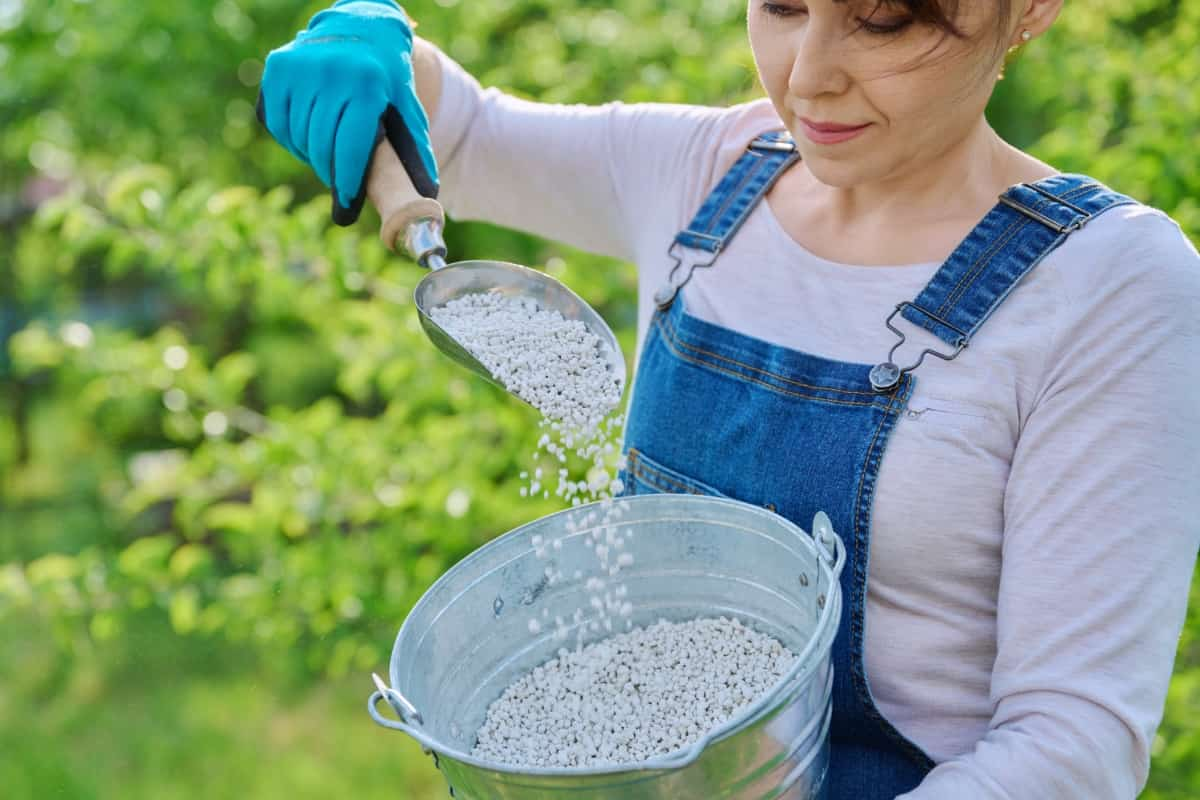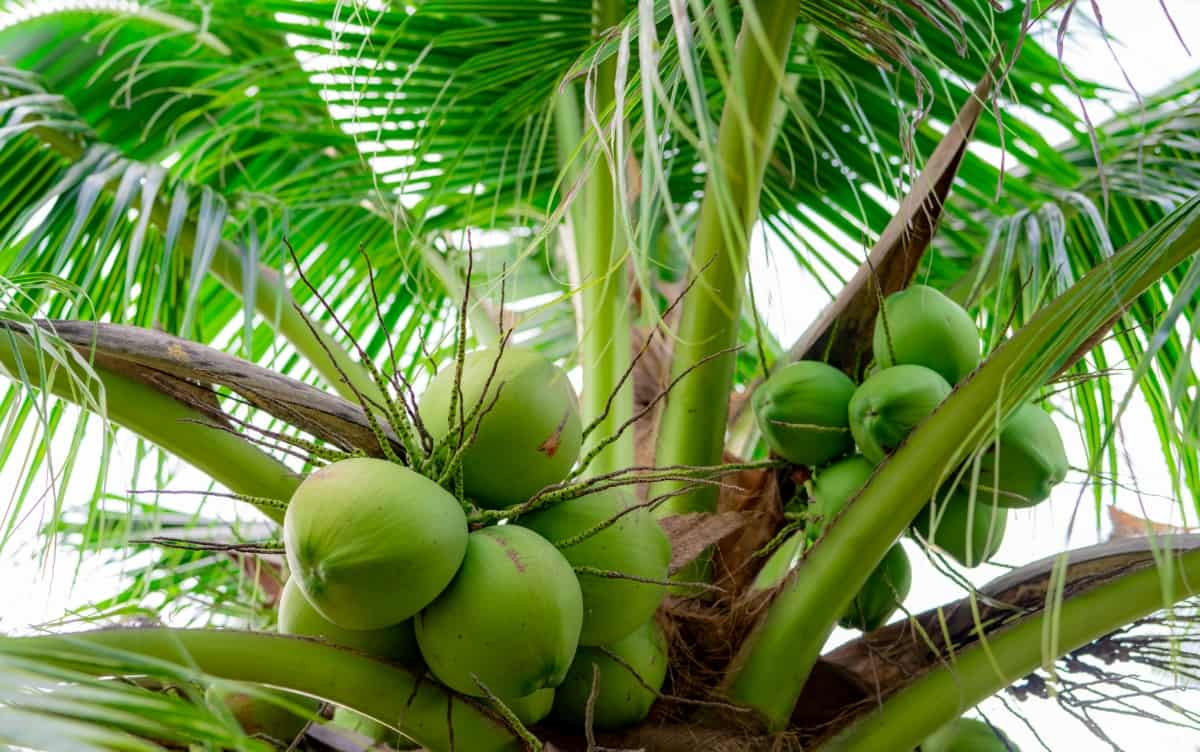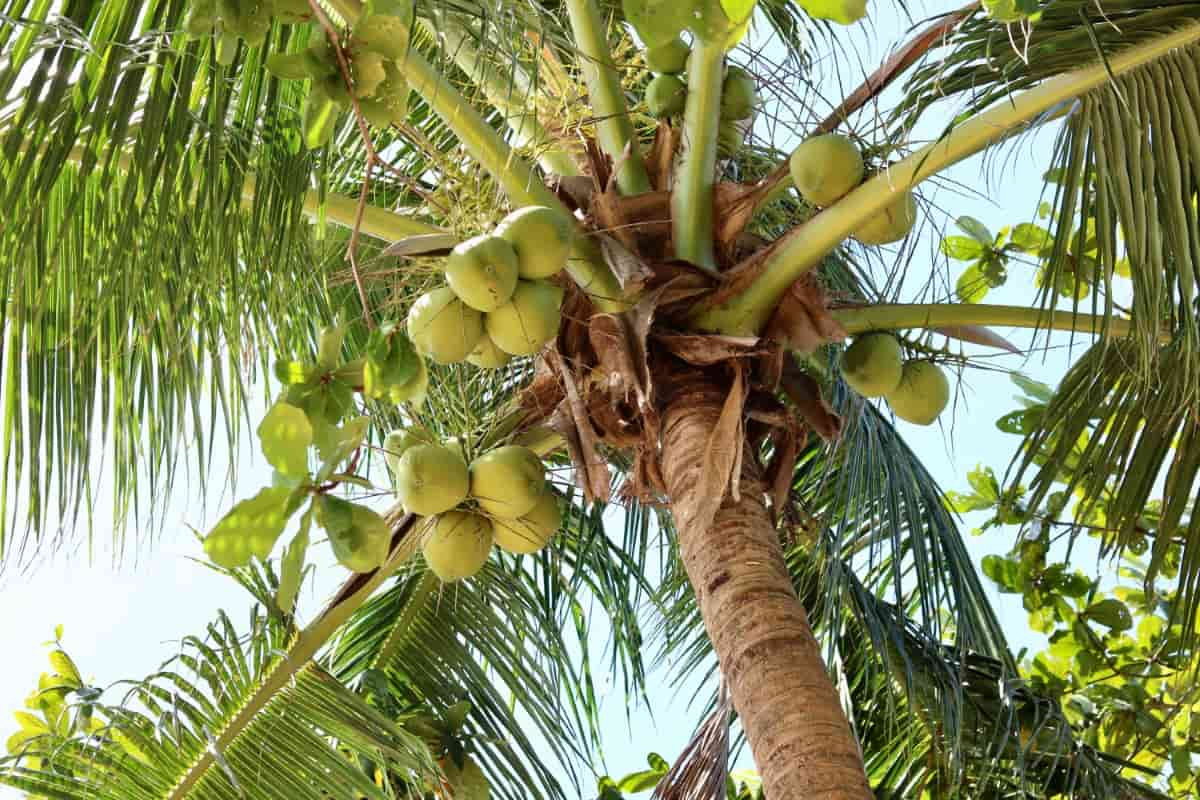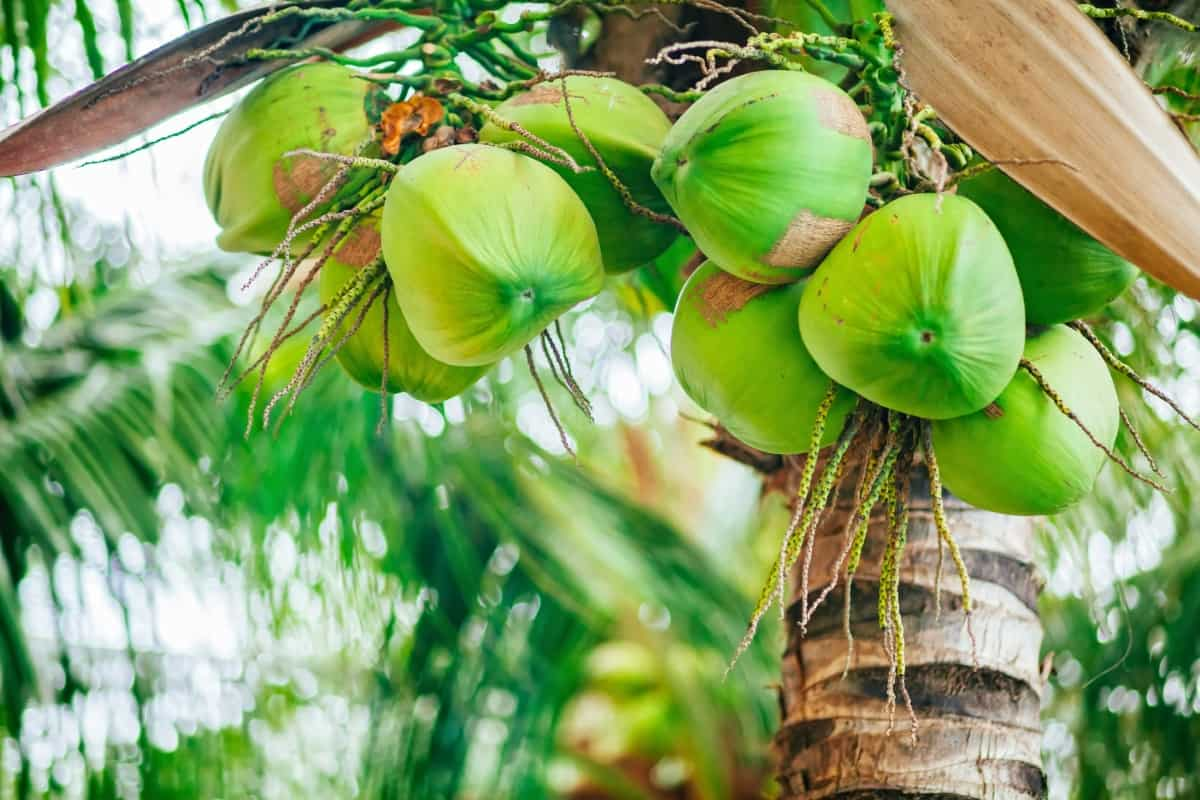Fertilizing Coconut trees is a crucial aspect of their care and maintenance. By knowing Coconut tree nutrient requirements, you can ensure that they thrive and produce an abundant yield of Coconuts. However, it’s essential to choose the best fertilizer for Coconut trees and apply it correctly. With proper knowledge and careful application techniques, Beginner’s guide to Coconut tree fertilization, you’ll be able to provide your Coconut trees with optimal nutrition for vibrant growth and bountiful harvests year after year.

Best Fertilizer for Coconut
Organic Fertilizers for Coconut Trees
Organic fertilizers are a great choice for Coconut trees as they provide nutrients naturally and sustainably. One popular organic Coconut tree fertilizer is compost, which is made by decomposing organic matter like leaves, kitchen scraps, and manure. It improves soil structure, allowing Coconut trees to absorb water and minerals more effectively.
To create nutrient-rich soil for Coconut trees, start by testing the pH level. Coconuts prefer slightly acidic to neutral soil with a pH range between 5.0 and 7.0. Another effective organic fertilizer is seaweed extract. Packed with beneficial minerals, vitamins, and hormones, it stimulates root development and enhances overall tree health. Plus, it helps improve resistance against pests and diseases.
For those looking to boost nitrogen levels in the soil, legume-cover crops such as Peanuts or Soybeans can be grown around Coconut trees. These plants can fix atmospheric nitrogen into usable forms that benefit the surrounding soil. Bone meal is the source of phosphorus for Coconut trees. Derived from animal bones, it releases this vital nutrient slowly over time while also promoting strong root development.
Nitrogen-Rich Fertilizers for Coconut Trees
Nitrogen is the best nutrient for the growth and development of Coconut trees. When it comes to nitrogen-rich fertilizers for Coconut trees, there are several options to choose from. One popular choice is urea, which contains a high concentration of nitrogen. Urea is easily soluble in water, making it readily available for absorption by the roots. Another option is ammonium sulfate, which not only provides nitrogen but also sulfur, another important nutrient for Coconut trees.
Another effective nitrogen-rich fertilizer option is fish emulsion. Made from decomposed fish waste, this organic fertilizer releases nutrients slowly over time while also enriching the soil with beneficial microorganisms. Using a balanced blend of these different types of nitrogen-rich fertilizers can help ensure that your Coconut trees receive adequate nutrition throughout their growth cycle. Remember to follow the Fertilizer application for Coconut provided by the manufacturer when applying these fertilizers to your Coconut trees.
Phosphorus-Rich Fertilizers for Coconut Trees
Phosphorus is an essential nutrient for Coconut trees. It aids in root development, flowering, and fruiting. When choosing a phosphorus-rich fertilizer for Coconut trees, there are several options to consider. One popular choice is bone meal, which is made from animal bones. Bone meal contains phosphorus and calcium, another important nutrient for Coconut trees. Another option is rock phosphate, a natural mineral that slowly releases phosphorus over time.
If you prefer organic options, you can opt for bat guano or fish emulsion fertilizers. Both of these sources are rich in phosphorus and provide additional benefits such as added micronutrients. When applying phosphorus-rich fertilizers to your Coconut trees, it’s important to follow the dosage instructions.
Potassium-Rich Fertilizers for Coconut Trees
Potassium plays a key role in various physiological processes, including photosynthesis, enzyme activation, and water regulation. There are several potassium-rich fertilizers available in the market that can help meet the potassium requirements of your Coconut trees. One such example is Muriate of Potash, which contains a high concentration of potassium chloride. This fertilizer is readily soluble in water and can be easily applied through irrigation.
In case you missed it: How to Grow Coconut from Seed to Harvest: Check How this Guide Helps Beginners

Another option is Sulphate of Potash, which contains potassium sulfate. This fertilizer not only provides potassium but also supplies sulfur, which is essential for protein synthesis in plants. Potassium nitrate is another popular choice among Coconut tree growers as it contains both nitrogen and potassium. This balanced formula ensures optimal growth while promoting fruit production. When applying potassium-rich fertilizers to your Coconut trees, it’s important to follow proper guidelines for dosage and timing.
Slow-Release Fertilizers for Coconut Trees
Slow-release fertilizers are a great option for Coconut trees because they provide a steady and continuous supply of nutrients over an extended period. Unlike traditional fertilizers that release their nutrients all at once, slow-release fertilizers gradually break down and release their nutrients as the Coconut tree needs them.
One benefit of using slow-release fertilizers is that they reduce the risk of nutrient leaching. Since these fertilizers release nutrients slowly, there is less chance of excess nutrients being washed away by rain or irrigation water. This means more efficient nutrient uptake by the Coconut tree and less waste.
Another advantage is that slow-release fertilizers require fewer applications compared to traditional fast-acting ones. With slow-release fertilizers, you can apply them less frequently, saving both time and money in the long run. Coconut trees also benefit from slow-release fertilizer’s ability to improve soil health. When using slow-release fertilizer for your Coconut trees, it’s important to follow the manufacturer’s instructions regarding application rates and timing.
Liquid Fertilizers for Coconut Trees
Liquid fertilizers are a convenient and effective option for nourishing Coconut trees. They come in various forms, including soluble powders, concentrates, and ready-to-use solutions. Liquid fertilizers are easily absorbed by the tree’s roots, allowing for quicker nutrient uptake. One advantage of liquid fertilizers is their ability to provide a balanced mix of nutrients. Many liquid fertilizers contain nitrogen, phosphorus, and potassium (NPK), which are essential for healthy Coconut tree growth.
These NPK ratios can be adjusted based on the specific needs of your trees. In addition to NPK nutrients, liquid fertilizers also often include micronutrients such as iron, zinc, manganese, and copper. When applying liquid fertilizer to Coconut trees, it is important to follow the instructions carefully. Dilute the fertilizer according to the recommended ratio or use it at full strength if it is already a ready-to-use solution. Apply evenly around the base of each tree while avoiding direct contact with leaves or trunk.
Biofertilizers for Coconut Trees
Biofertilizers can be a great addition to your Coconut tree fertilizer regimen. These are natural and eco-friendly alternatives that provide essential nutrients to the soil and help enhance the growth of Coconut trees. One type of biofertilizer commonly used for Coconut trees is mycorrhizal fungi. These beneficial fungi help in nutrient absorption and improve root development.
They also protect against soil pathogens, making them an excellent choice for maintaining healthy Coconut trees. Another biofertilizer option is rhizobium bacteria. These bacteria fix atmospheric nitrogen into a usable form for plants. Adding rhizobium-based biofertilizers to your Coconut tree’s soil can increase nitrogen availability, promoting lush green foliage and better fruit production.
In case you missed it: 14 Common Coconut Tree Problems: How to Fix Them, Solutions, and Treatment

Homemade Fertilizers for Coconut Trees
Homemade fertilizers can be a great option for Coconut tree owners who want to take a more natural approach to nourishing their trees. Plus, making your fertilizer allows you to have control over the ingredients and quality of what you’re applying. One popular homemade fertilizer for Coconut trees is compost tea. This liquid is made by steeping compost in water for several days, creating a powerful brew that can provide essential nutrients to your trees.
Simply strain out the solids and apply the liquid directly to the soil around your Coconut trees. Another option is banana peel fertilizer. To make this homemade fertilizer, simply chop banana peels into small pieces and bury them around the base of your trees. Over time, they will decompose and release their nutrients into the soil.
Epsom salt solution is also commonly used as a homemade fertilizer for Coconut trees. Dissolve Epsom salts in water according to package instructions. The magnesium content in Epsom salts helps improve overall plant health. Coffee grounds are another excellent homemade fertilizer option. They contain nitrogen, phosphorus, potassium, and other trace minerals that can benefit Coconut tree growth and maintenance. Simply sprinkle coffee grounds around your trees or mix them into the soil.
Coconut Tree Fertilizer Application Guidelines
- Timing: It’s best to apply fertilizer during the rainy season or just before it begins. This allows for better absorption by the tree’s roots and reduces the risk of nutrient runoff.
- Quantity: The amount of fertilizer needed depends on various factors such as tree size, age, and soil fertility. As a general rule, young Coconut trees require less fertilizer compared to mature ones.
- Spread evenly: Distribute the fertilizer around the base of the tree in a circular pattern, making sure it reaches beyond the drip line. Avoid piling up large amounts near the trunk, as this can cause root burn.
- Watering after application: After applying fertilizer, water the area thoroughly to help dissolve and distribute nutrients into the soil.
- Frequency: For established Coconut trees, fertilize once or twice a year with a slow-release organic fertilizer or follow specific product instructions.
In case you missed it: Coconut Coir Benefits for Gardening, Making, Uses

Conclusion
Choosing the best fertilizer for your Coconut trees is crucial in ensuring their healthy growth and abundant yield. Whether you opt for organic fertilizers, nitrogen-rich options, phosphorus-rich blends, potassium-enhanced formulas, or micronutrient supplements – each type has its benefits and application guidelines. By providing proper nutrition through well-chosen fertilization practices, Coconut tree care tips, you will promote vigorous growth, increased resistance against pests and diseases, and ultimately enjoy a bountiful harvest from your beloved Coconut trees.
- How to Grow Hibiscus from Flower
- Plantation Ideas for Home Decoration: A Beginners Guide
- Flower Garden Designs and Layouts for Beginners
- Planting and Spacing Techniques in Papaya: A Beginner’s Guide
- Growing Gold: Essential Techniques for Planting Pineapples
- How to Make Kalanchoe Plant Bushy: Home Remedies and Solutions
- 11 Reasons Why Your Gardenia is Not Blooming: Home Remedies and Solutions
- Eco Elegance: The Guide to Designing a Drought-Tolerant Landscape
- Gardening on a Slope: Strategies for Hillside Landscaping